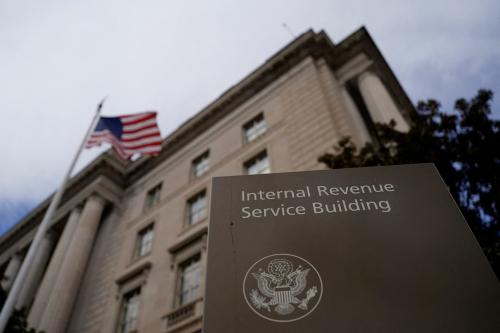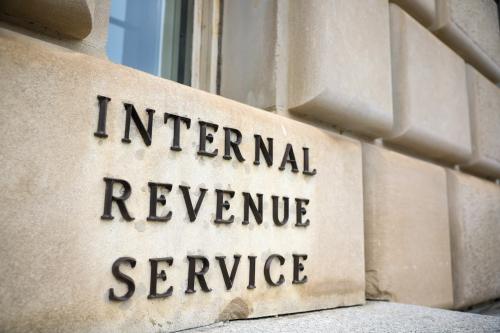This year, as they have since World War II, millions of everyday taxpayers have diligently submitted their tax returns to the Internal Revenue Service (IRS). However, something is rotten in the state of the IRS. Under the new administration, the agency has departed from longstanding data privacy practices and pursued immense, indiscriminate, and counterproductive workforce reductions. These decisions will hamper the agency’s core tax collection functions, robbing the American public of legally owed and much needed revenue.
In the first few months of Trump’s term, the IRS saw a 13% reduction in staffing, including the attempted firing of around 7,000 probationary workers. Federal judges, one of whom described the process used to fire the workers as a “sham,” ordered the IRS to reinstate those wrongfully fired. Those employees were set to resume work in mid-April, but the IRS paused their planned return after rulings from the U.S. Court of Appeals for the Fourth Circuit and the Supreme Court allowed the government to proceed with the firings. While the legal cases continue to play out, the destruction of the federal workforce is far from over. The administration has plans to cut up to 25% of IRS staff, starting with the IRS Office of Civil Rights and Compliance. Longer-term reductions of as much as 50% are reportedly on the table.
With fewer hands on deck, the IRS will have less capacity to collect money from tax evaders—especially high-income taxpayers, whose audits take more resources but yield $12 for every additional dollar spent. The IRS will also have less ability to advocate for taxpayers and assist those who need help filing. As our colleague Barry Johnson has said, the threatened IRS workers are “improving the taxpayer experience, reducing the burden on taxpayers from unnecessary audits, producing statistics critical for understanding the tax system and economy, and helping make all IRS employees more efficient.”
Among those recently fired were 50 members of the senior executive service responsible for vital IT issues including cybersecurity and modernization. These cuts are especially worrying given the new administration’s efforts to erode longstanding IRS data privacy protections.
In February, DOGE—Elon Musk’s self-styled “Department of Government Efficiency”—unsuccessfully attempted to gain access to sensitive taxpayer data, including Social Security numbers. The Treasury Department and DOGE eventually reached an agreement in which DOGE employees were barred from accessing individually identifiable taxpayer data—but, worryingly, DOGE continued pushing the IRS to share tax data in violation of privacy laws.
DOGE’s attempted incursions into taxpayer data are being contested in the courts. As Yale economist and law professor Natasha Sarin has written, they are seeking highly sensitive information when there is “no legitimate reason for the ‘DOGE’ to have access.” At least once, a DOGE staffer has broken Treasury rules by sending a spreadsheet with names and transaction information from Treasury to other members of the Trump administration. Another DOGE staffer had, prior to his government service, allegedly leaked a company’s information to a competitor and provided tech support to a cybercrime ring. Thus, even the perception that DOGE employees could access taxpayer data may undermine confidence in the tax system.
Undocumented immigrants are one group of tax filers with particular reason to fear for the safety of their tax data. In February, the Department of Homeland Security (DHS) asked the IRS for the addresses of 700,000 people that it suspected were undocumented immigrants. In keeping with longstanding privacy practices, the IRS initially refused that request, but much of the agency’s upper leadership has been replaced. A deal has been reached between DHS and the Treasury Department despite IRS lawyers stating that the deal likely violated privacy laws; DHS is reportedly now seeking to use tax data to help deport up to seven million people. The latest acting IRS commissioner announced her plans to resign shortly after the deal became official.
The IRS has for years told undocumented immigrants to file their taxes, giving them reason to believe that the government would not use their taxpaying against them. The reversal in IRS policy is a betrayal of trust that effectively punishes undocumented immigrants for following the law. Those immigrants are now disincentivized from filing, jeopardizing tax revenue—in 2023, they paid an estimated $66 billion in federal taxes.
Americans have traditionally been reliable taxpayers with high tax morale and a near-consensus view that taxpaying is a civic responsibility. Today, that tradition is imperiled by the administration setting ablaze the agency tasked with assisting tax filers and ensuring that tax laws apply to everyone. American taxpayers deserve better.
The Brookings Institution is committed to quality, independence, and impact.
We are supported by a diverse array of funders. In line with our values and policies, each Brookings publication represents the sole views of its author(s).








Commentary
IRS cuts and privacy threats endanger public trust and revenue
April 15, 2025